Exam 9: Game Theory and Strategic Thinking
Exam 1: Economics and Life149 Questions
Exam 2: Specialization and Exchange154 Questions
Exam 3: Markets170 Questions
Exam 4: Elasticity159 Questions
Exam 5: Efficiency145 Questions
Exam 6: Government Intervention170 Questions
Exam 7: Consumer Behavior140 Questions
Exam 8: Behavioral Economics: a Closer Look at Decision Making107 Questions
Exam 9: Game Theory and Strategic Thinking155 Questions
Exam 10: Information149 Questions
Exam 11: Time and Uncertainty125 Questions
Exam 12: The Costs of Production152 Questions
Exam 13: Perfect Competition166 Questions
Exam 14: Monopoly151 Questions
Exam 15: Monopolistic Competition and Oligopoly157 Questions
Exam 16: The Facts of Production176 Questions
Exam 17: International Trade149 Questions
Exam 18: Externalities131 Questions
Exam 19: Public Goods and Common Resources112 Questions
Exam 20: Taxation and the Public Budget163 Questions
Exam 21: Poverty, Inequality, and Discrimination134 Questions
Exam 22: Political Choices113 Questions
Exam 23: Public Policy and Choice Architecture79 Questions
Select questions type
A strategy that is the best one to follow no matter what strategy other players choose is called a:
(Multiple Choice)
4.9/5  (38)
(38)
When all players in a game choose the best strategy they can, given the choices of all other players, there is always a:
(Multiple Choice)
4.9/5  (35)
(35)
One player must make a decision before another player does in a:
(Multiple Choice)
4.7/5  (36)
(36)
If a player is following a tit-for-tat strategy in a repeated game and an opponent makes a cooperative move, the player will:
(Multiple Choice)
4.8/5  (32)
(32)
Reaching a positive-positive outcome through a commitment strategy:
(Multiple Choice)
4.8/5  (37)
(37)
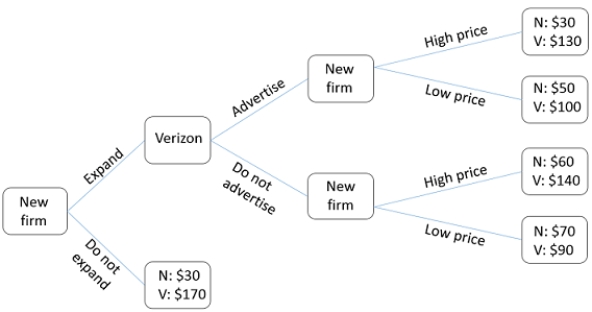 The figure shown displays the choices that could be made by Verizon and a new firm in the industry. The payoffs are the profits (in millions)these companies will earn as a result of their choices.What will be the outcome of this game?
The figure shown displays the choices that could be made by Verizon and a new firm in the industry. The payoffs are the profits (in millions)these companies will earn as a result of their choices.What will be the outcome of this game?
(Multiple Choice)
4.7/5  (39)
(39)
If each player in a repeated game responds by imitating the action of an opponent in the previous round, the players are following a:
(Multiple Choice)
4.8/5  (45)
(45)
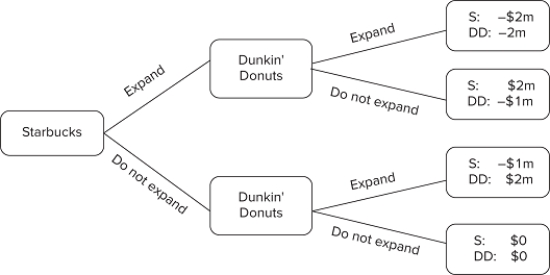 The figure shown displays the choices that could be made by two coffee shops: Starbucks and Dunkin' Donuts. Both companies are trying to decide whether or not to expand into a new area. The area can only handle one coffee shop's expansion, and the expansion of one shop will cause the other to lose some business. If both coffee shops expand, the market will become saturated and neither will do well. The payoffs for these shops are the additional profits (or losses)they will earn.Starbucks:
The figure shown displays the choices that could be made by two coffee shops: Starbucks and Dunkin' Donuts. Both companies are trying to decide whether or not to expand into a new area. The area can only handle one coffee shop's expansion, and the expansion of one shop will cause the other to lose some business. If both coffee shops expand, the market will become saturated and neither will do well. The payoffs for these shops are the additional profits (or losses)they will earn.Starbucks:
(Multiple Choice)
5.0/5  (28)
(28)
Which of the following statements about repeated games is true?
(Multiple Choice)
4.9/5  (29)
(29)
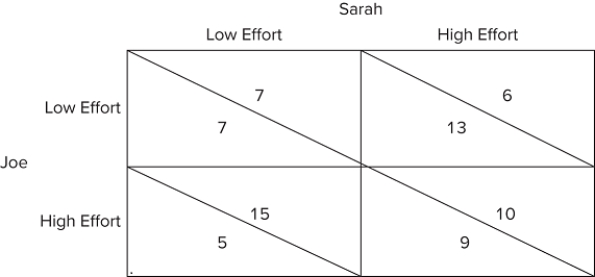 The figure shown represents the payoffs involved when Sarah and Joe work on a school project together for a single grade. They both will enjoy a higher grade when more effort is put into the project, but they also get pleasure from goofing off and not working on the project. The payoffs can be thought of as the utility each would get from the effort they individually put forth and the grade they jointly receive.If Joe and Sarah act in their own self-interest, what utility will Sarah receive?
The figure shown represents the payoffs involved when Sarah and Joe work on a school project together for a single grade. They both will enjoy a higher grade when more effort is put into the project, but they also get pleasure from goofing off and not working on the project. The payoffs can be thought of as the utility each would get from the effort they individually put forth and the grade they jointly receive.If Joe and Sarah act in their own self-interest, what utility will Sarah receive?
(Multiple Choice)
4.8/5  (34)
(34)
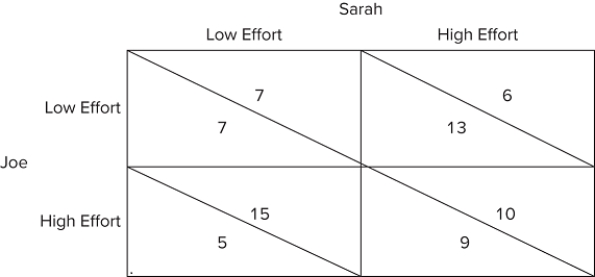 The figure shown represents the payoffs involved when Sarah and Joe work on a school project together for a single grade. They both will enjoy a higher grade when more effort is put into the project, but they also get pleasure from goofing off and not working on the project. The payoffs can be thought of as the utility each would get from the effort they individually put forth and the grade they jointly receive.What payoff can we predict Joe will receive as the outcome of this game?
The figure shown represents the payoffs involved when Sarah and Joe work on a school project together for a single grade. They both will enjoy a higher grade when more effort is put into the project, but they also get pleasure from goofing off and not working on the project. The payoffs can be thought of as the utility each would get from the effort they individually put forth and the grade they jointly receive.What payoff can we predict Joe will receive as the outcome of this game?
(Multiple Choice)
4.7/5  (33)
(33)
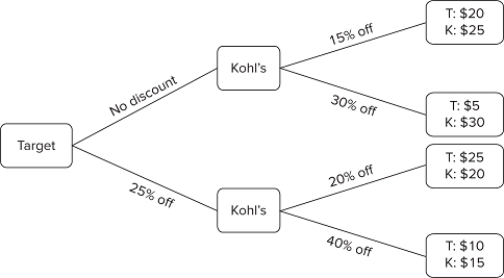 The figure shown displays the choices that could be made by two firms in an industry: Target and Kohl's. Both companies are trying to decide how much to discount their products. The payoffs are the profits (in millions)these companies will earn as a result of their choices.What will be the outcome of this game?
The figure shown displays the choices that could be made by two firms in an industry: Target and Kohl's. Both companies are trying to decide how much to discount their products. The payoffs are the profits (in millions)these companies will earn as a result of their choices.What will be the outcome of this game?
(Multiple Choice)
4.9/5  (41)
(41)
In which type of game does one player make an offer that the other player must then accept or reject?
(Multiple Choice)
4.7/5  (31)
(31)
How often does collusion occur in the current world of business?
(Multiple Choice)
4.8/5  (46)
(46)
Showing 121 - 140 of 155
Filters
- Essay(0)
- Multiple Choice(0)
- Short Answer(0)
- True False(0)
- Matching(0)